Strategic Management Analysis: Aldi's Approach and Frameworks
VerifiedAdded on 2022/12/23
|18
|5202
|70
Report
AI Summary
This report provides a comprehensive analysis of Aldi's strategic management. It begins by defining strategic management and discussing Aldi's adoption of deliberate and emergent approaches to strategy formulation, highlighting the balance between them and their impact on the company's success, particularly in the UK market. The report then examines the differences between deliberate and emergent strategies and recommends an increased focus on emergent strategies to adapt to market changes. It emphasizes the importance of human resources, financial support, and system support for implementing strategic changes. Furthermore, the report applies PESTLE and Porter's Five Forces analyses to identify macro-environmental and industry issues faced by Aldi, along with the company's responses. Finally, the report explores the application of Porter's value chain, generic strategies, and the Ansoff Matrix to understand Aldi's strategic capabilities and overall success. The report concludes by emphasizing the importance of considering social, technological, and legal factors in Aldi's future strategies.
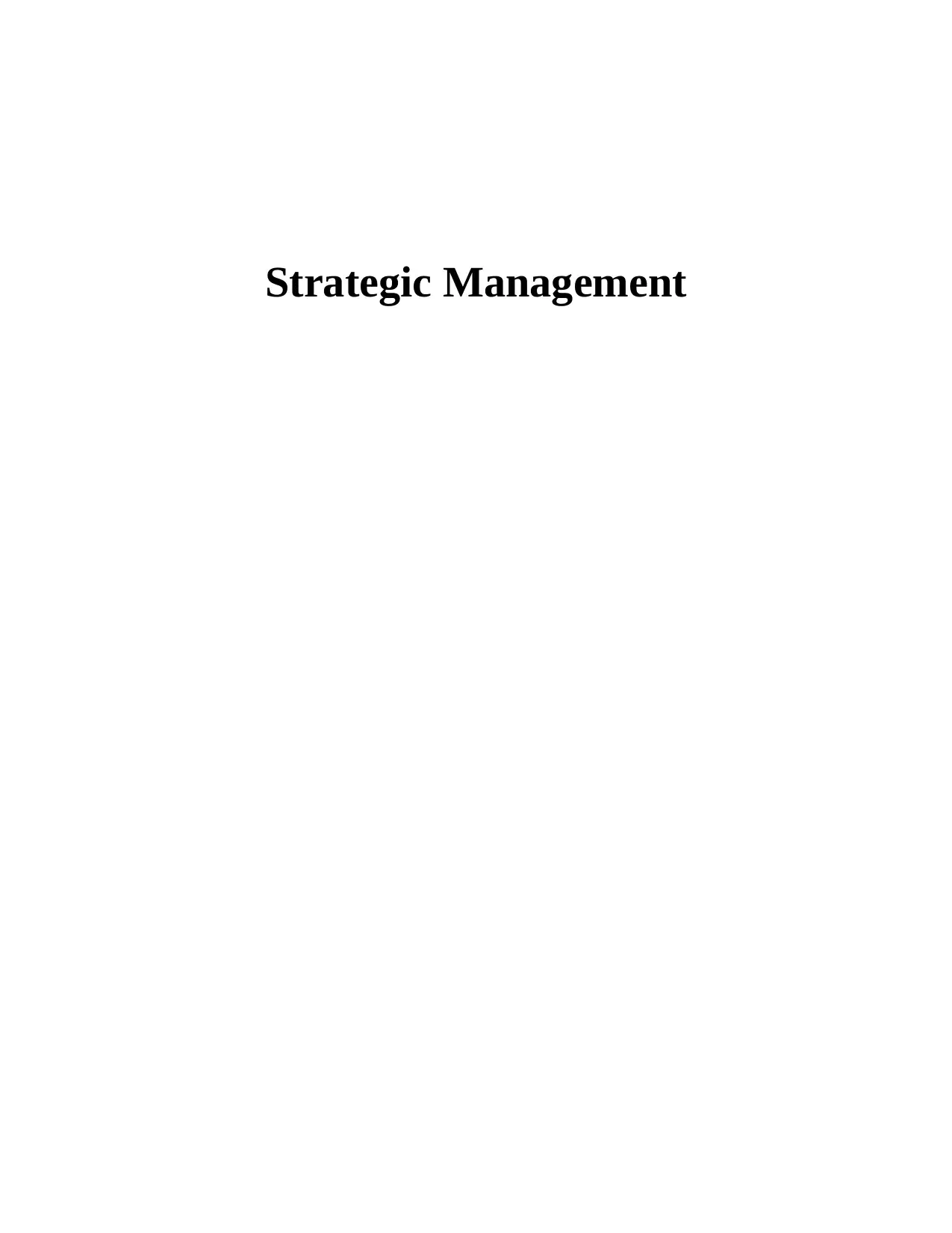
Strategic Management
Paraphrase This Document
Need a fresh take? Get an instant paraphrase of this document with our AI Paraphraser
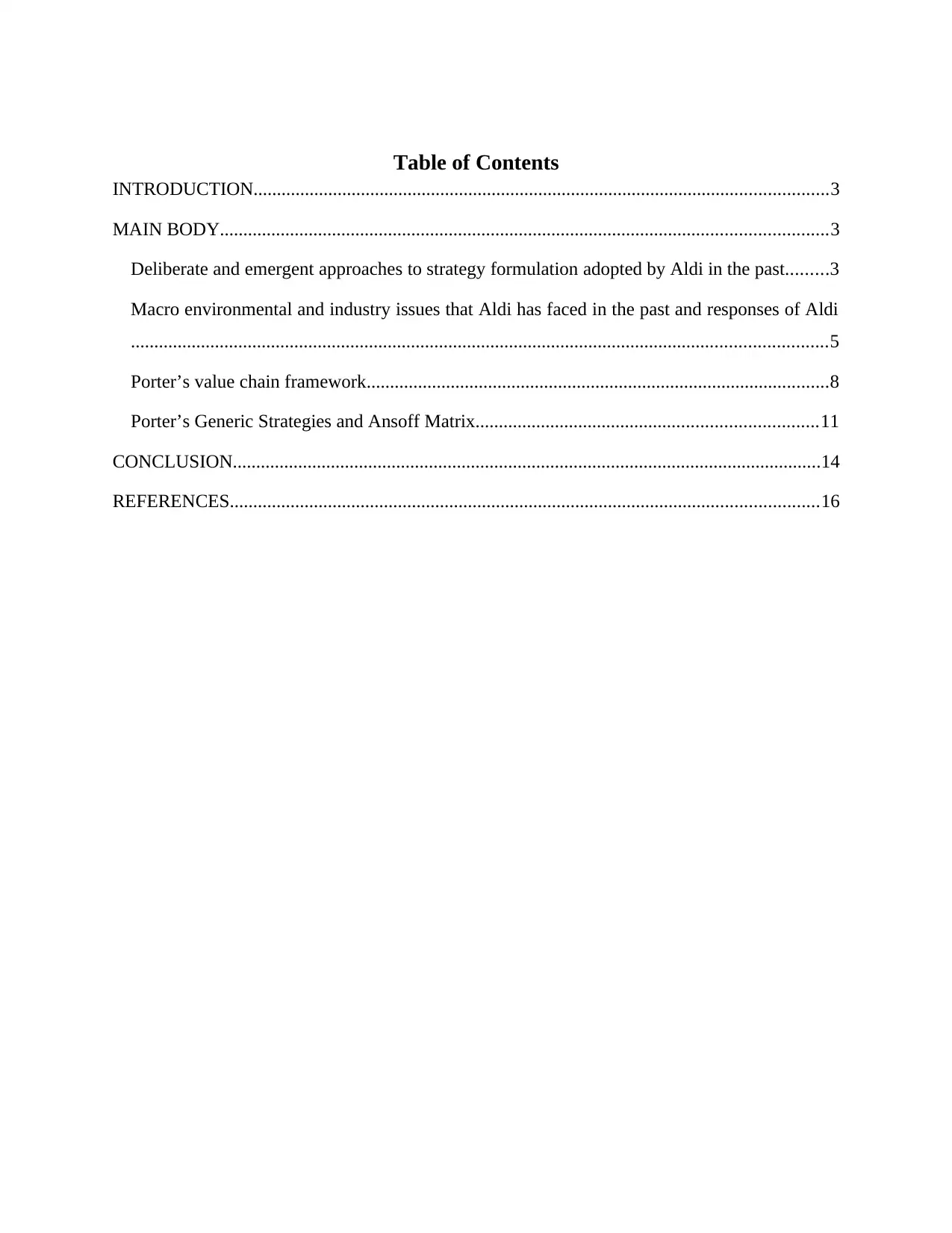
Table of Contents
INTRODUCTION...........................................................................................................................3
MAIN BODY..................................................................................................................................3
Deliberate and emergent approaches to strategy formulation adopted by Aldi in the past.........3
Macro environmental and industry issues that Aldi has faced in the past and responses of Aldi
.....................................................................................................................................................5
Porter’s value chain framework...................................................................................................8
Porter’s Generic Strategies and Ansoff Matrix.........................................................................11
CONCLUSION..............................................................................................................................14
REFERENCES..............................................................................................................................16
INTRODUCTION...........................................................................................................................3
MAIN BODY..................................................................................................................................3
Deliberate and emergent approaches to strategy formulation adopted by Aldi in the past.........3
Macro environmental and industry issues that Aldi has faced in the past and responses of Aldi
.....................................................................................................................................................5
Porter’s value chain framework...................................................................................................8
Porter’s Generic Strategies and Ansoff Matrix.........................................................................11
CONCLUSION..............................................................................................................................14
REFERENCES..............................................................................................................................16
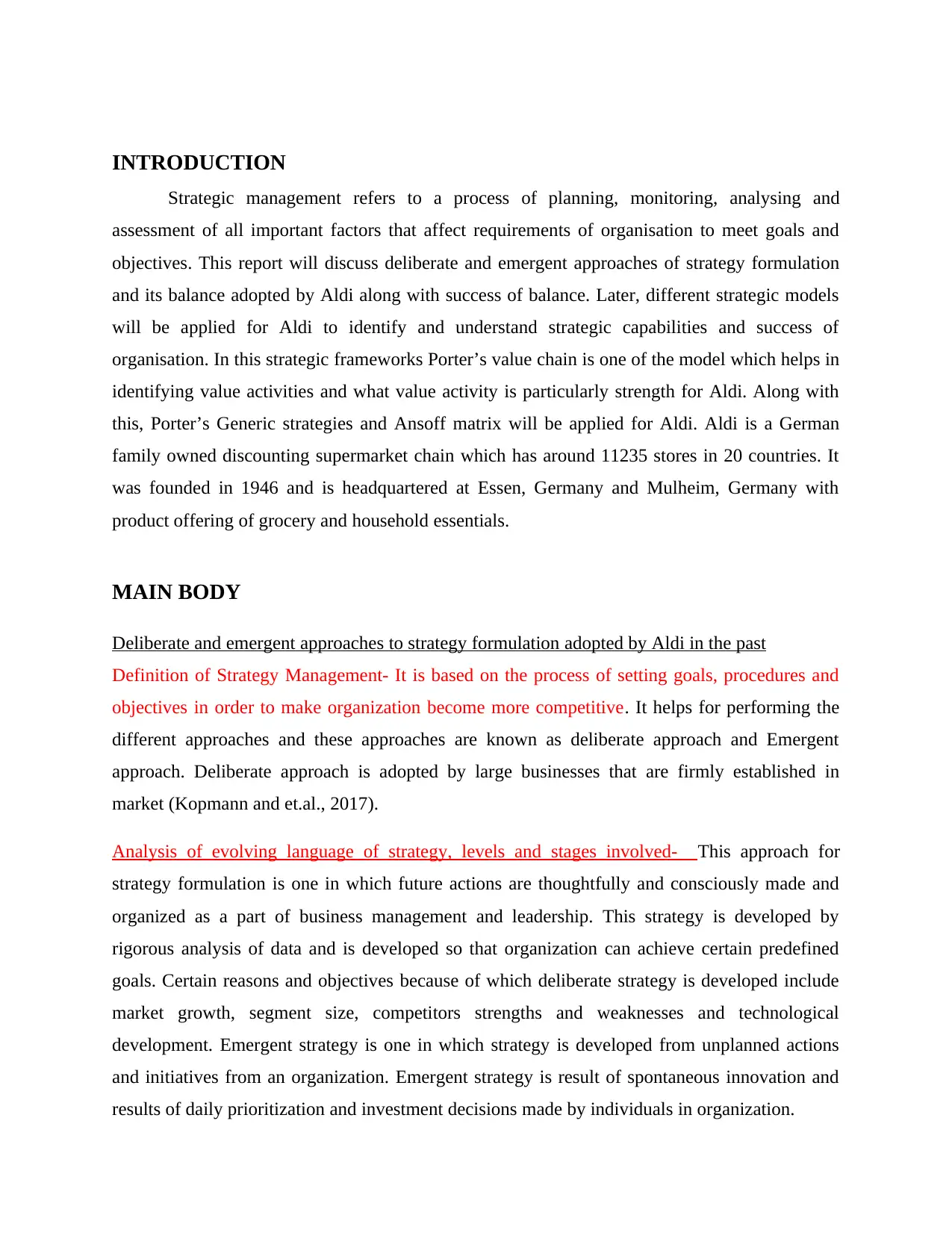
INTRODUCTION
Strategic management refers to a process of planning, monitoring, analysing and
assessment of all important factors that affect requirements of organisation to meet goals and
objectives. This report will discuss deliberate and emergent approaches of strategy formulation
and its balance adopted by Aldi along with success of balance. Later, different strategic models
will be applied for Aldi to identify and understand strategic capabilities and success of
organisation. In this strategic frameworks Porter’s value chain is one of the model which helps in
identifying value activities and what value activity is particularly strength for Aldi. Along with
this, Porter’s Generic strategies and Ansoff matrix will be applied for Aldi. Aldi is a German
family owned discounting supermarket chain which has around 11235 stores in 20 countries. It
was founded in 1946 and is headquartered at Essen, Germany and Mulheim, Germany with
product offering of grocery and household essentials.
MAIN BODY
Deliberate and emergent approaches to strategy formulation adopted by Aldi in the past
Definition of Strategy Management- It is based on the process of setting goals, procedures and
objectives in order to make organization become more competitive. It helps for performing the
different approaches and these approaches are known as deliberate approach and Emergent
approach. Deliberate approach is adopted by large businesses that are firmly established in
market (Kopmann and et.al., 2017).
Analysis of evolving language of strategy, levels and stages involved- This approach for
strategy formulation is one in which future actions are thoughtfully and consciously made and
organized as a part of business management and leadership. This strategy is developed by
rigorous analysis of data and is developed so that organization can achieve certain predefined
goals. Certain reasons and objectives because of which deliberate strategy is developed include
market growth, segment size, competitors strengths and weaknesses and technological
development. Emergent strategy is one in which strategy is developed from unplanned actions
and initiatives from an organization. Emergent strategy is result of spontaneous innovation and
results of daily prioritization and investment decisions made by individuals in organization.
Strategic management refers to a process of planning, monitoring, analysing and
assessment of all important factors that affect requirements of organisation to meet goals and
objectives. This report will discuss deliberate and emergent approaches of strategy formulation
and its balance adopted by Aldi along with success of balance. Later, different strategic models
will be applied for Aldi to identify and understand strategic capabilities and success of
organisation. In this strategic frameworks Porter’s value chain is one of the model which helps in
identifying value activities and what value activity is particularly strength for Aldi. Along with
this, Porter’s Generic strategies and Ansoff matrix will be applied for Aldi. Aldi is a German
family owned discounting supermarket chain which has around 11235 stores in 20 countries. It
was founded in 1946 and is headquartered at Essen, Germany and Mulheim, Germany with
product offering of grocery and household essentials.
MAIN BODY
Deliberate and emergent approaches to strategy formulation adopted by Aldi in the past
Definition of Strategy Management- It is based on the process of setting goals, procedures and
objectives in order to make organization become more competitive. It helps for performing the
different approaches and these approaches are known as deliberate approach and Emergent
approach. Deliberate approach is adopted by large businesses that are firmly established in
market (Kopmann and et.al., 2017).
Analysis of evolving language of strategy, levels and stages involved- This approach for
strategy formulation is one in which future actions are thoughtfully and consciously made and
organized as a part of business management and leadership. This strategy is developed by
rigorous analysis of data and is developed so that organization can achieve certain predefined
goals. Certain reasons and objectives because of which deliberate strategy is developed include
market growth, segment size, competitors strengths and weaknesses and technological
development. Emergent strategy is one in which strategy is developed from unplanned actions
and initiatives from an organization. Emergent strategy is result of spontaneous innovation and
results of daily prioritization and investment decisions made by individuals in organization.
⊘ This is a preview!⊘
Do you want full access?
Subscribe today to unlock all pages.

Trusted by 1+ million students worldwide
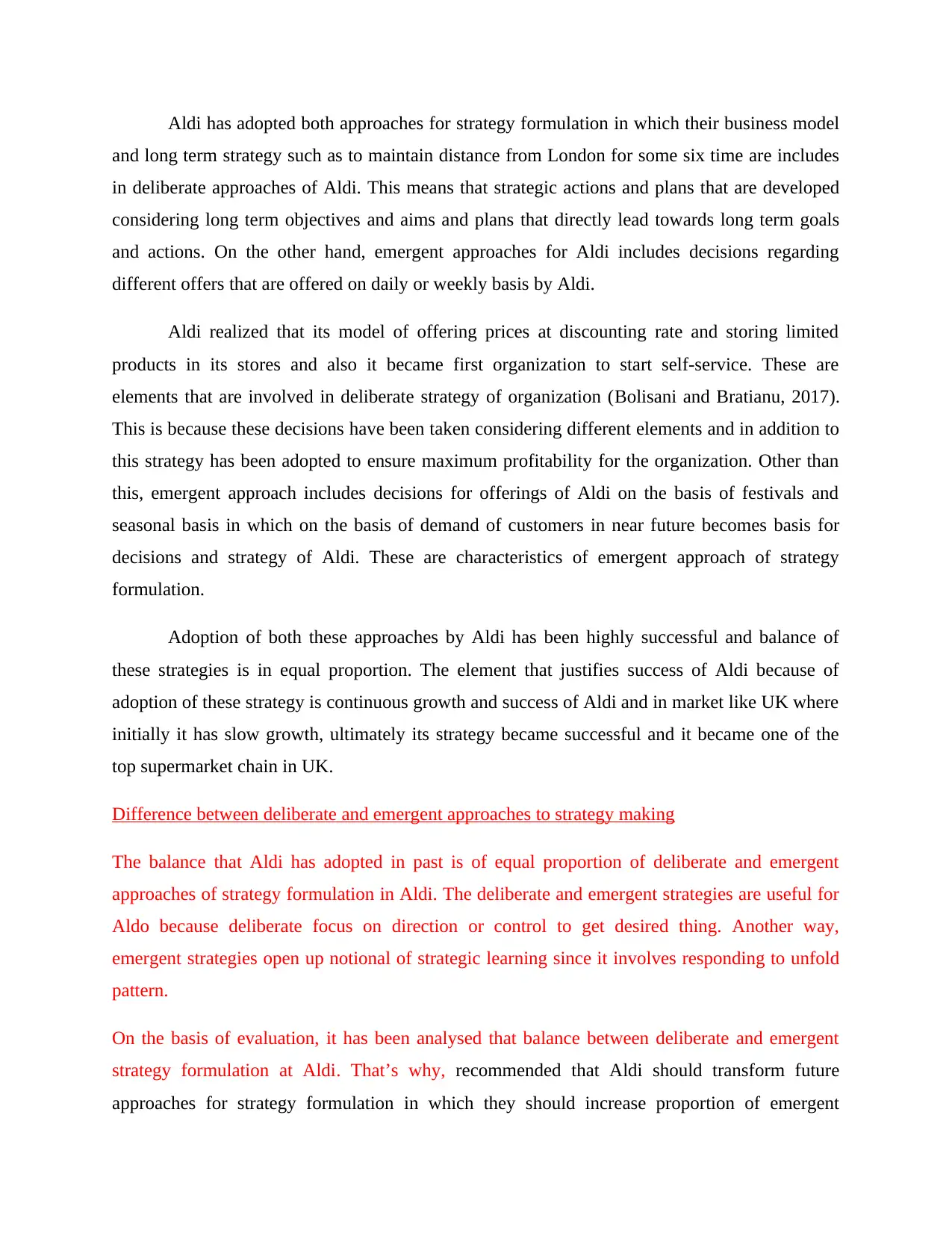
Aldi has adopted both approaches for strategy formulation in which their business model
and long term strategy such as to maintain distance from London for some six time are includes
in deliberate approaches of Aldi. This means that strategic actions and plans that are developed
considering long term objectives and aims and plans that directly lead towards long term goals
and actions. On the other hand, emergent approaches for Aldi includes decisions regarding
different offers that are offered on daily or weekly basis by Aldi.
Aldi realized that its model of offering prices at discounting rate and storing limited
products in its stores and also it became first organization to start self-service. These are
elements that are involved in deliberate strategy of organization (Bolisani and Bratianu, 2017).
This is because these decisions have been taken considering different elements and in addition to
this strategy has been adopted to ensure maximum profitability for the organization. Other than
this, emergent approach includes decisions for offerings of Aldi on the basis of festivals and
seasonal basis in which on the basis of demand of customers in near future becomes basis for
decisions and strategy of Aldi. These are characteristics of emergent approach of strategy
formulation.
Adoption of both these approaches by Aldi has been highly successful and balance of
these strategies is in equal proportion. The element that justifies success of Aldi because of
adoption of these strategy is continuous growth and success of Aldi and in market like UK where
initially it has slow growth, ultimately its strategy became successful and it became one of the
top supermarket chain in UK.
Difference between deliberate and emergent approaches to strategy making
The balance that Aldi has adopted in past is of equal proportion of deliberate and emergent
approaches of strategy formulation in Aldi. The deliberate and emergent strategies are useful for
Aldo because deliberate focus on direction or control to get desired thing. Another way,
emergent strategies open up notional of strategic learning since it involves responding to unfold
pattern.
On the basis of evaluation, it has been analysed that balance between deliberate and emergent
strategy formulation at Aldi. That’s why, recommended that Aldi should transform future
approaches for strategy formulation in which they should increase proportion of emergent
and long term strategy such as to maintain distance from London for some six time are includes
in deliberate approaches of Aldi. This means that strategic actions and plans that are developed
considering long term objectives and aims and plans that directly lead towards long term goals
and actions. On the other hand, emergent approaches for Aldi includes decisions regarding
different offers that are offered on daily or weekly basis by Aldi.
Aldi realized that its model of offering prices at discounting rate and storing limited
products in its stores and also it became first organization to start self-service. These are
elements that are involved in deliberate strategy of organization (Bolisani and Bratianu, 2017).
This is because these decisions have been taken considering different elements and in addition to
this strategy has been adopted to ensure maximum profitability for the organization. Other than
this, emergent approach includes decisions for offerings of Aldi on the basis of festivals and
seasonal basis in which on the basis of demand of customers in near future becomes basis for
decisions and strategy of Aldi. These are characteristics of emergent approach of strategy
formulation.
Adoption of both these approaches by Aldi has been highly successful and balance of
these strategies is in equal proportion. The element that justifies success of Aldi because of
adoption of these strategy is continuous growth and success of Aldi and in market like UK where
initially it has slow growth, ultimately its strategy became successful and it became one of the
top supermarket chain in UK.
Difference between deliberate and emergent approaches to strategy making
The balance that Aldi has adopted in past is of equal proportion of deliberate and emergent
approaches of strategy formulation in Aldi. The deliberate and emergent strategies are useful for
Aldo because deliberate focus on direction or control to get desired thing. Another way,
emergent strategies open up notional of strategic learning since it involves responding to unfold
pattern.
On the basis of evaluation, it has been analysed that balance between deliberate and emergent
strategy formulation at Aldi. That’s why, recommended that Aldi should transform future
approaches for strategy formulation in which they should increase proportion of emergent
Paraphrase This Document
Need a fresh take? Get an instant paraphrase of this document with our AI Paraphraser
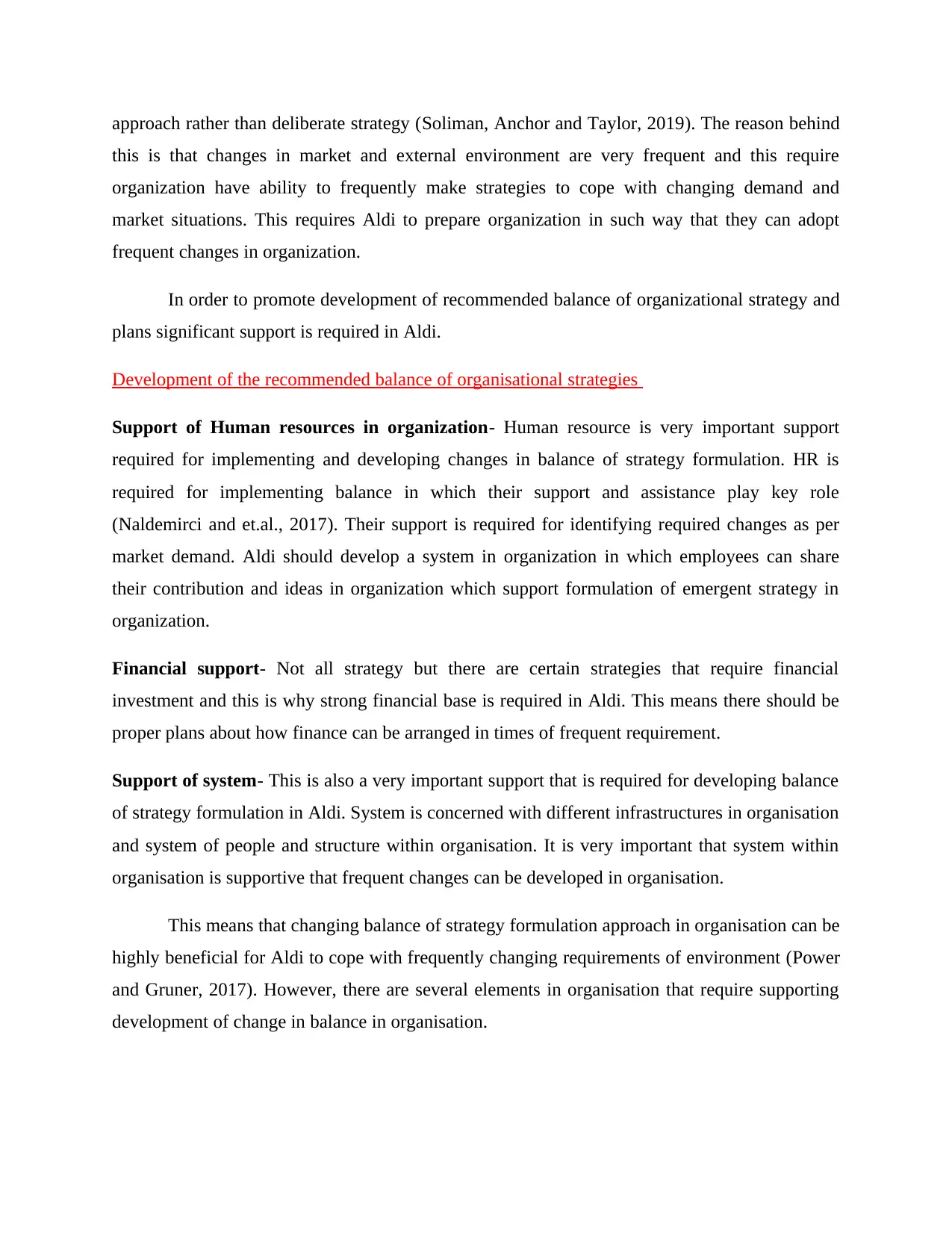
approach rather than deliberate strategy (Soliman, Anchor and Taylor, 2019). The reason behind
this is that changes in market and external environment are very frequent and this require
organization have ability to frequently make strategies to cope with changing demand and
market situations. This requires Aldi to prepare organization in such way that they can adopt
frequent changes in organization.
In order to promote development of recommended balance of organizational strategy and
plans significant support is required in Aldi.
Development of the recommended balance of organisational strategies
Support of Human resources in organization- Human resource is very important support
required for implementing and developing changes in balance of strategy formulation. HR is
required for implementing balance in which their support and assistance play key role
(Naldemirci and et.al., 2017). Their support is required for identifying required changes as per
market demand. Aldi should develop a system in organization in which employees can share
their contribution and ideas in organization which support formulation of emergent strategy in
organization.
Financial support- Not all strategy but there are certain strategies that require financial
investment and this is why strong financial base is required in Aldi. This means there should be
proper plans about how finance can be arranged in times of frequent requirement.
Support of system- This is also a very important support that is required for developing balance
of strategy formulation in Aldi. System is concerned with different infrastructures in organisation
and system of people and structure within organisation. It is very important that system within
organisation is supportive that frequent changes can be developed in organisation.
This means that changing balance of strategy formulation approach in organisation can be
highly beneficial for Aldi to cope with frequently changing requirements of environment (Power
and Gruner, 2017). However, there are several elements in organisation that require supporting
development of change in balance in organisation.
this is that changes in market and external environment are very frequent and this require
organization have ability to frequently make strategies to cope with changing demand and
market situations. This requires Aldi to prepare organization in such way that they can adopt
frequent changes in organization.
In order to promote development of recommended balance of organizational strategy and
plans significant support is required in Aldi.
Development of the recommended balance of organisational strategies
Support of Human resources in organization- Human resource is very important support
required for implementing and developing changes in balance of strategy formulation. HR is
required for implementing balance in which their support and assistance play key role
(Naldemirci and et.al., 2017). Their support is required for identifying required changes as per
market demand. Aldi should develop a system in organization in which employees can share
their contribution and ideas in organization which support formulation of emergent strategy in
organization.
Financial support- Not all strategy but there are certain strategies that require financial
investment and this is why strong financial base is required in Aldi. This means there should be
proper plans about how finance can be arranged in times of frequent requirement.
Support of system- This is also a very important support that is required for developing balance
of strategy formulation in Aldi. System is concerned with different infrastructures in organisation
and system of people and structure within organisation. It is very important that system within
organisation is supportive that frequent changes can be developed in organisation.
This means that changing balance of strategy formulation approach in organisation can be
highly beneficial for Aldi to cope with frequently changing requirements of environment (Power
and Gruner, 2017). However, there are several elements in organisation that require supporting
development of change in balance in organisation.
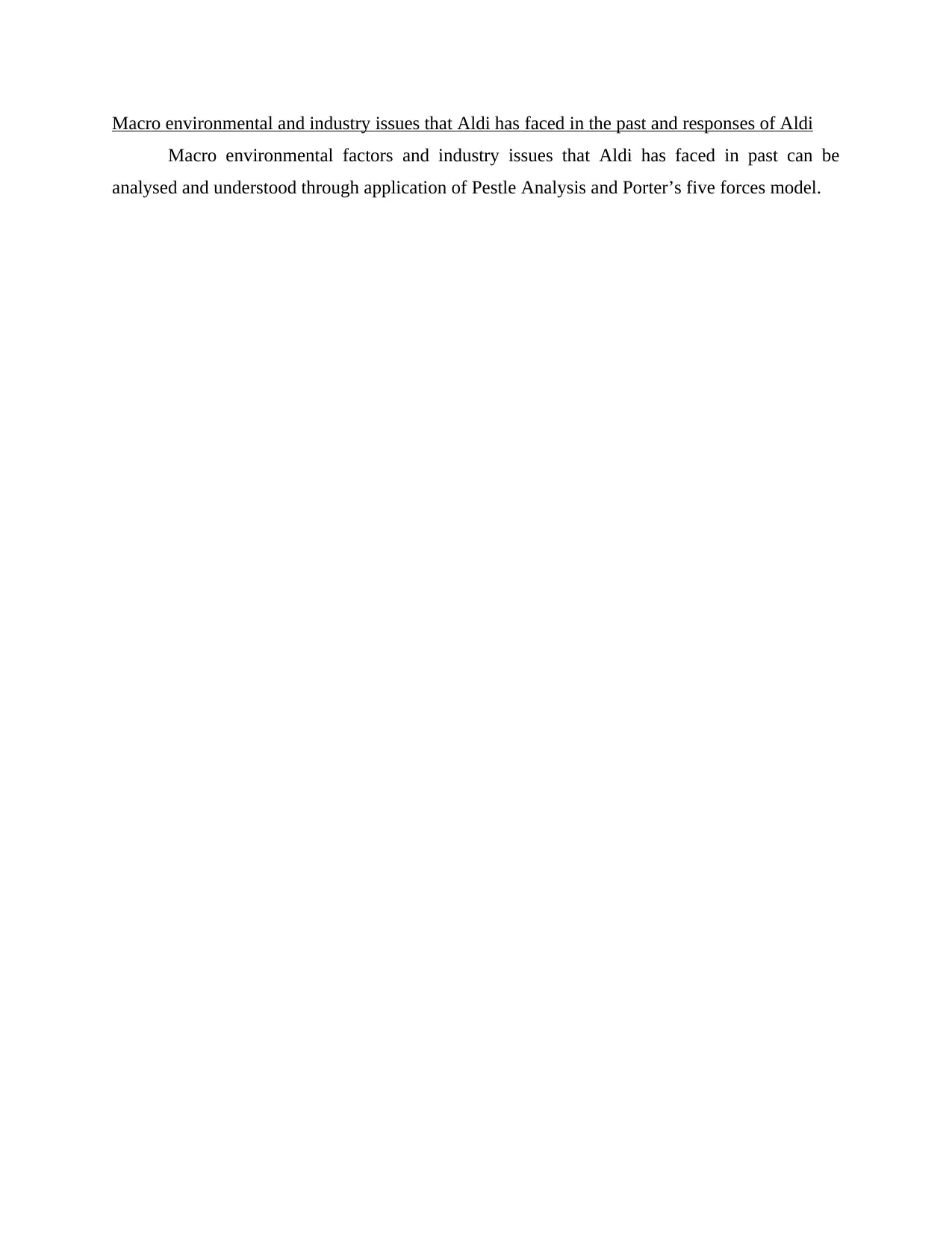
Macro environmental and industry issues that Aldi has faced in the past and responses of Aldi
Macro environmental factors and industry issues that Aldi has faced in past can be
analysed and understood through application of Pestle Analysis and Porter’s five forces model.
Macro environmental factors and industry issues that Aldi has faced in past can be
analysed and understood through application of Pestle Analysis and Porter’s five forces model.
⊘ This is a preview!⊘
Do you want full access?
Subscribe today to unlock all pages.

Trusted by 1+ million students worldwide
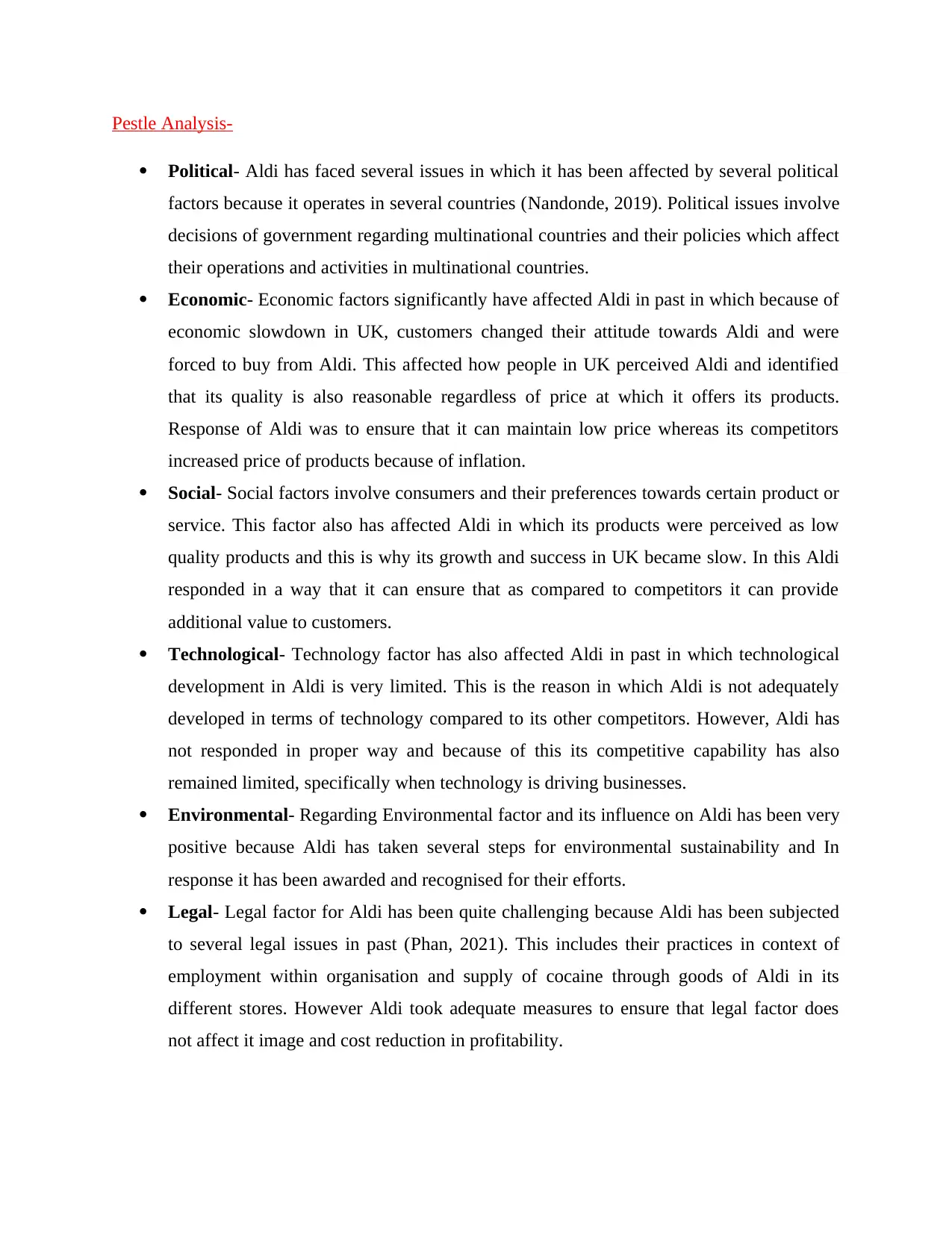
Pestle Analysis-
Political- Aldi has faced several issues in which it has been affected by several political
factors because it operates in several countries (Nandonde, 2019). Political issues involve
decisions of government regarding multinational countries and their policies which affect
their operations and activities in multinational countries.
Economic- Economic factors significantly have affected Aldi in past in which because of
economic slowdown in UK, customers changed their attitude towards Aldi and were
forced to buy from Aldi. This affected how people in UK perceived Aldi and identified
that its quality is also reasonable regardless of price at which it offers its products.
Response of Aldi was to ensure that it can maintain low price whereas its competitors
increased price of products because of inflation.
Social- Social factors involve consumers and their preferences towards certain product or
service. This factor also has affected Aldi in which its products were perceived as low
quality products and this is why its growth and success in UK became slow. In this Aldi
responded in a way that it can ensure that as compared to competitors it can provide
additional value to customers.
Technological- Technology factor has also affected Aldi in past in which technological
development in Aldi is very limited. This is the reason in which Aldi is not adequately
developed in terms of technology compared to its other competitors. However, Aldi has
not responded in proper way and because of this its competitive capability has also
remained limited, specifically when technology is driving businesses.
Environmental- Regarding Environmental factor and its influence on Aldi has been very
positive because Aldi has taken several steps for environmental sustainability and In
response it has been awarded and recognised for their efforts.
Legal- Legal factor for Aldi has been quite challenging because Aldi has been subjected
to several legal issues in past (Phan, 2021). This includes their practices in context of
employment within organisation and supply of cocaine through goods of Aldi in its
different stores. However Aldi took adequate measures to ensure that legal factor does
not affect it image and cost reduction in profitability.
Political- Aldi has faced several issues in which it has been affected by several political
factors because it operates in several countries (Nandonde, 2019). Political issues involve
decisions of government regarding multinational countries and their policies which affect
their operations and activities in multinational countries.
Economic- Economic factors significantly have affected Aldi in past in which because of
economic slowdown in UK, customers changed their attitude towards Aldi and were
forced to buy from Aldi. This affected how people in UK perceived Aldi and identified
that its quality is also reasonable regardless of price at which it offers its products.
Response of Aldi was to ensure that it can maintain low price whereas its competitors
increased price of products because of inflation.
Social- Social factors involve consumers and their preferences towards certain product or
service. This factor also has affected Aldi in which its products were perceived as low
quality products and this is why its growth and success in UK became slow. In this Aldi
responded in a way that it can ensure that as compared to competitors it can provide
additional value to customers.
Technological- Technology factor has also affected Aldi in past in which technological
development in Aldi is very limited. This is the reason in which Aldi is not adequately
developed in terms of technology compared to its other competitors. However, Aldi has
not responded in proper way and because of this its competitive capability has also
remained limited, specifically when technology is driving businesses.
Environmental- Regarding Environmental factor and its influence on Aldi has been very
positive because Aldi has taken several steps for environmental sustainability and In
response it has been awarded and recognised for their efforts.
Legal- Legal factor for Aldi has been quite challenging because Aldi has been subjected
to several legal issues in past (Phan, 2021). This includes their practices in context of
employment within organisation and supply of cocaine through goods of Aldi in its
different stores. However Aldi took adequate measures to ensure that legal factor does
not affect it image and cost reduction in profitability.
Paraphrase This Document
Need a fresh take? Get an instant paraphrase of this document with our AI Paraphraser
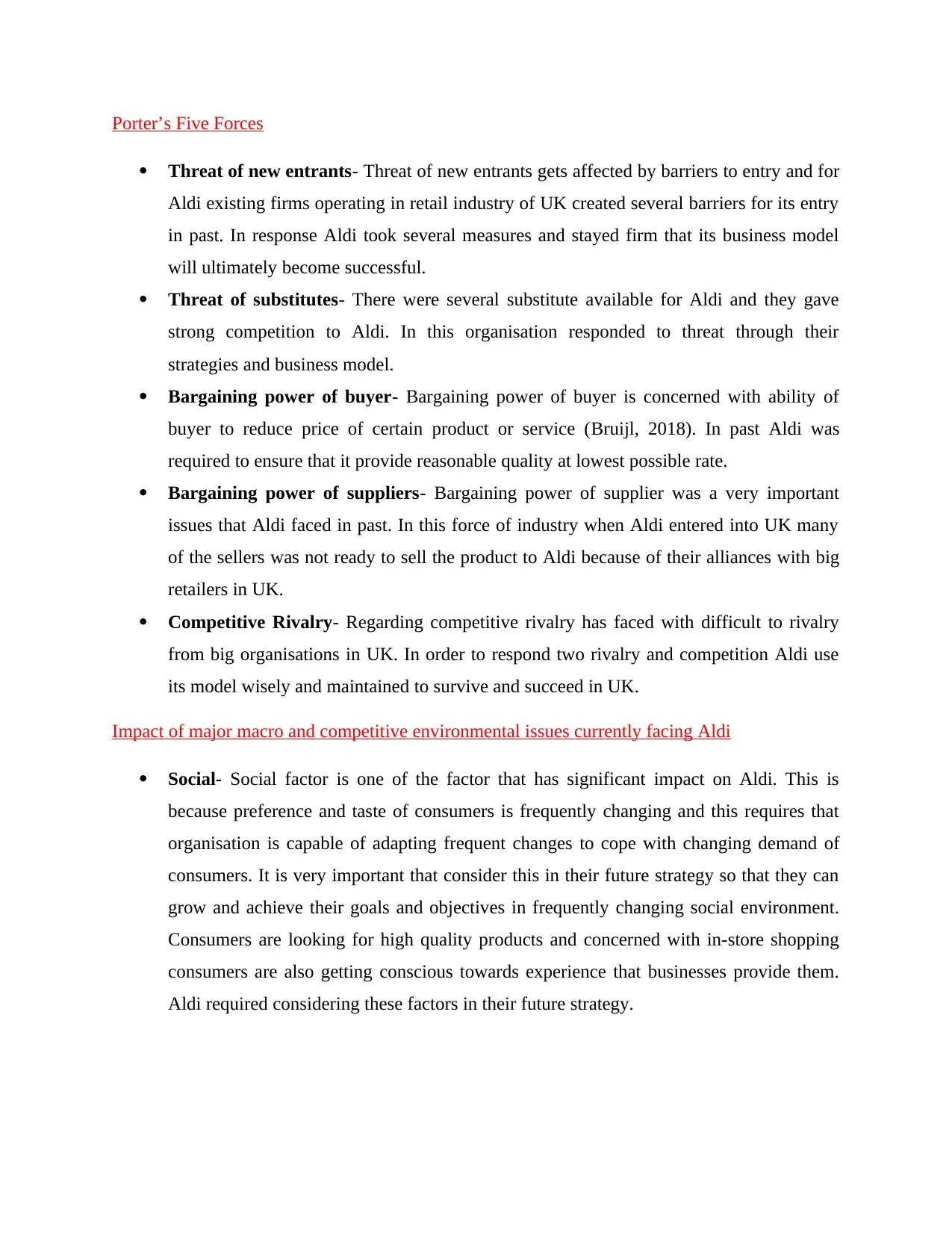
Porter’s Five Forces
Threat of new entrants- Threat of new entrants gets affected by barriers to entry and for
Aldi existing firms operating in retail industry of UK created several barriers for its entry
in past. In response Aldi took several measures and stayed firm that its business model
will ultimately become successful.
Threat of substitutes- There were several substitute available for Aldi and they gave
strong competition to Aldi. In this organisation responded to threat through their
strategies and business model.
Bargaining power of buyer- Bargaining power of buyer is concerned with ability of
buyer to reduce price of certain product or service (Bruijl, 2018). In past Aldi was
required to ensure that it provide reasonable quality at lowest possible rate.
Bargaining power of suppliers- Bargaining power of supplier was a very important
issues that Aldi faced in past. In this force of industry when Aldi entered into UK many
of the sellers was not ready to sell the product to Aldi because of their alliances with big
retailers in UK.
Competitive Rivalry- Regarding competitive rivalry has faced with difficult to rivalry
from big organisations in UK. In order to respond two rivalry and competition Aldi use
its model wisely and maintained to survive and succeed in UK.
Impact of major macro and competitive environmental issues currently facing Aldi
Social- Social factor is one of the factor that has significant impact on Aldi. This is
because preference and taste of consumers is frequently changing and this requires that
organisation is capable of adapting frequent changes to cope with changing demand of
consumers. It is very important that consider this in their future strategy so that they can
grow and achieve their goals and objectives in frequently changing social environment.
Consumers are looking for high quality products and concerned with in-store shopping
consumers are also getting conscious towards experience that businesses provide them.
Aldi required considering these factors in their future strategy.
Threat of new entrants- Threat of new entrants gets affected by barriers to entry and for
Aldi existing firms operating in retail industry of UK created several barriers for its entry
in past. In response Aldi took several measures and stayed firm that its business model
will ultimately become successful.
Threat of substitutes- There were several substitute available for Aldi and they gave
strong competition to Aldi. In this organisation responded to threat through their
strategies and business model.
Bargaining power of buyer- Bargaining power of buyer is concerned with ability of
buyer to reduce price of certain product or service (Bruijl, 2018). In past Aldi was
required to ensure that it provide reasonable quality at lowest possible rate.
Bargaining power of suppliers- Bargaining power of supplier was a very important
issues that Aldi faced in past. In this force of industry when Aldi entered into UK many
of the sellers was not ready to sell the product to Aldi because of their alliances with big
retailers in UK.
Competitive Rivalry- Regarding competitive rivalry has faced with difficult to rivalry
from big organisations in UK. In order to respond two rivalry and competition Aldi use
its model wisely and maintained to survive and succeed in UK.
Impact of major macro and competitive environmental issues currently facing Aldi
Social- Social factor is one of the factor that has significant impact on Aldi. This is
because preference and taste of consumers is frequently changing and this requires that
organisation is capable of adapting frequent changes to cope with changing demand of
consumers. It is very important that consider this in their future strategy so that they can
grow and achieve their goals and objectives in frequently changing social environment.
Consumers are looking for high quality products and concerned with in-store shopping
consumers are also getting conscious towards experience that businesses provide them.
Aldi required considering these factors in their future strategy.
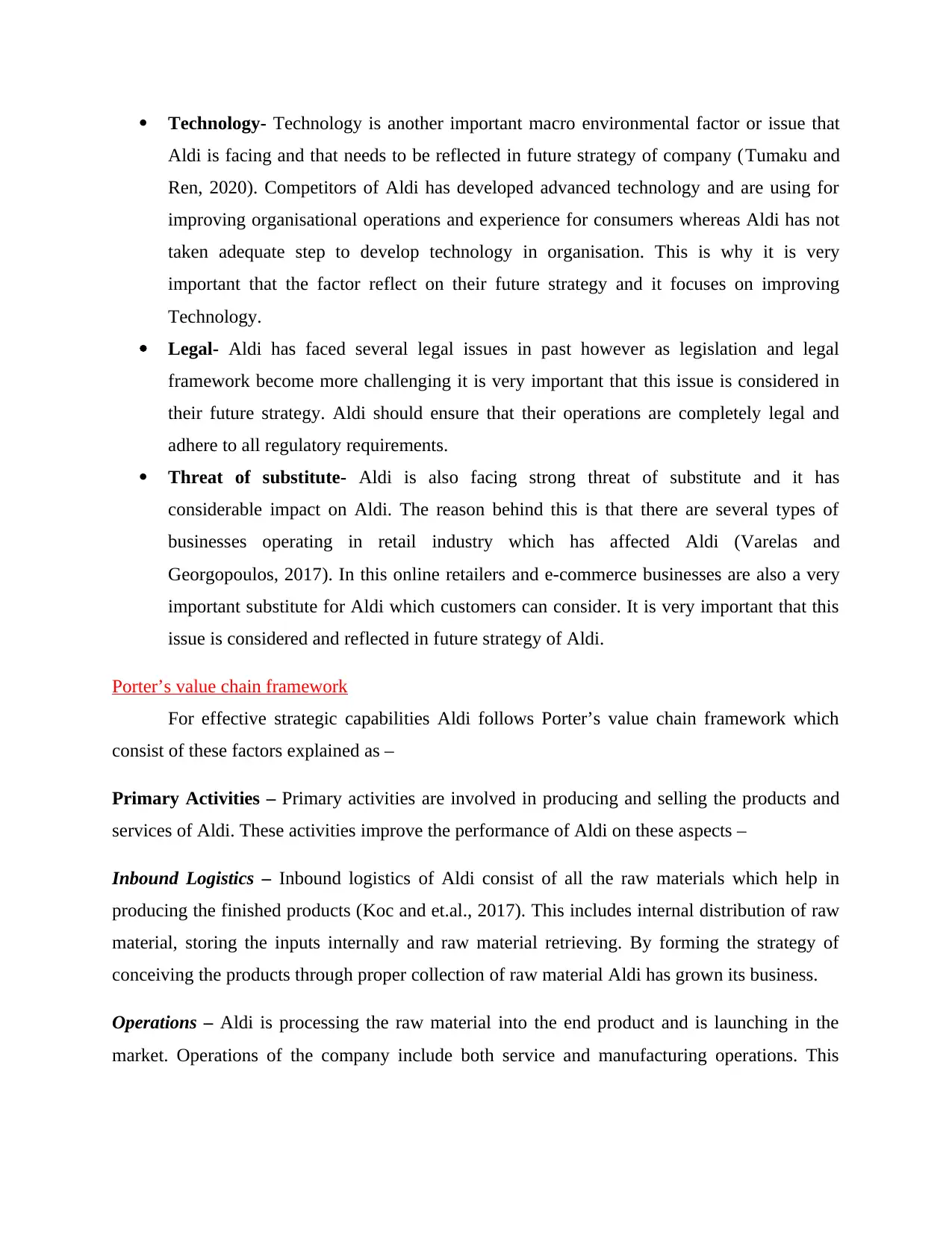
Technology- Technology is another important macro environmental factor or issue that
Aldi is facing and that needs to be reflected in future strategy of company (Tumaku and
Ren, 2020). Competitors of Aldi has developed advanced technology and are using for
improving organisational operations and experience for consumers whereas Aldi has not
taken adequate step to develop technology in organisation. This is why it is very
important that the factor reflect on their future strategy and it focuses on improving
Technology.
Legal- Aldi has faced several legal issues in past however as legislation and legal
framework become more challenging it is very important that this issue is considered in
their future strategy. Aldi should ensure that their operations are completely legal and
adhere to all regulatory requirements.
Threat of substitute- Aldi is also facing strong threat of substitute and it has
considerable impact on Aldi. The reason behind this is that there are several types of
businesses operating in retail industry which has affected Aldi (Varelas and
Georgopoulos, 2017). In this online retailers and e-commerce businesses are also a very
important substitute for Aldi which customers can consider. It is very important that this
issue is considered and reflected in future strategy of Aldi.
Porter’s value chain framework
For effective strategic capabilities Aldi follows Porter’s value chain framework which
consist of these factors explained as –
Primary Activities – Primary activities are involved in producing and selling the products and
services of Aldi. These activities improve the performance of Aldi on these aspects –
Inbound Logistics – Inbound logistics of Aldi consist of all the raw materials which help in
producing the finished products (Koc and et.al., 2017). This includes internal distribution of raw
material, storing the inputs internally and raw material retrieving. By forming the strategy of
conceiving the products through proper collection of raw material Aldi has grown its business.
Operations – Aldi is processing the raw material into the end product and is launching in the
market. Operations of the company include both service and manufacturing operations. This
Aldi is facing and that needs to be reflected in future strategy of company (Tumaku and
Ren, 2020). Competitors of Aldi has developed advanced technology and are using for
improving organisational operations and experience for consumers whereas Aldi has not
taken adequate step to develop technology in organisation. This is why it is very
important that the factor reflect on their future strategy and it focuses on improving
Technology.
Legal- Aldi has faced several legal issues in past however as legislation and legal
framework become more challenging it is very important that this issue is considered in
their future strategy. Aldi should ensure that their operations are completely legal and
adhere to all regulatory requirements.
Threat of substitute- Aldi is also facing strong threat of substitute and it has
considerable impact on Aldi. The reason behind this is that there are several types of
businesses operating in retail industry which has affected Aldi (Varelas and
Georgopoulos, 2017). In this online retailers and e-commerce businesses are also a very
important substitute for Aldi which customers can consider. It is very important that this
issue is considered and reflected in future strategy of Aldi.
Porter’s value chain framework
For effective strategic capabilities Aldi follows Porter’s value chain framework which
consist of these factors explained as –
Primary Activities – Primary activities are involved in producing and selling the products and
services of Aldi. These activities improve the performance of Aldi on these aspects –
Inbound Logistics – Inbound logistics of Aldi consist of all the raw materials which help in
producing the finished products (Koc and et.al., 2017). This includes internal distribution of raw
material, storing the inputs internally and raw material retrieving. By forming the strategy of
conceiving the products through proper collection of raw material Aldi has grown its business.
Operations – Aldi is processing the raw material into the end product and is launching in the
market. Operations of the company include both service and manufacturing operations. This
⊘ This is a preview!⊘
Do you want full access?
Subscribe today to unlock all pages.

Trusted by 1+ million students worldwide
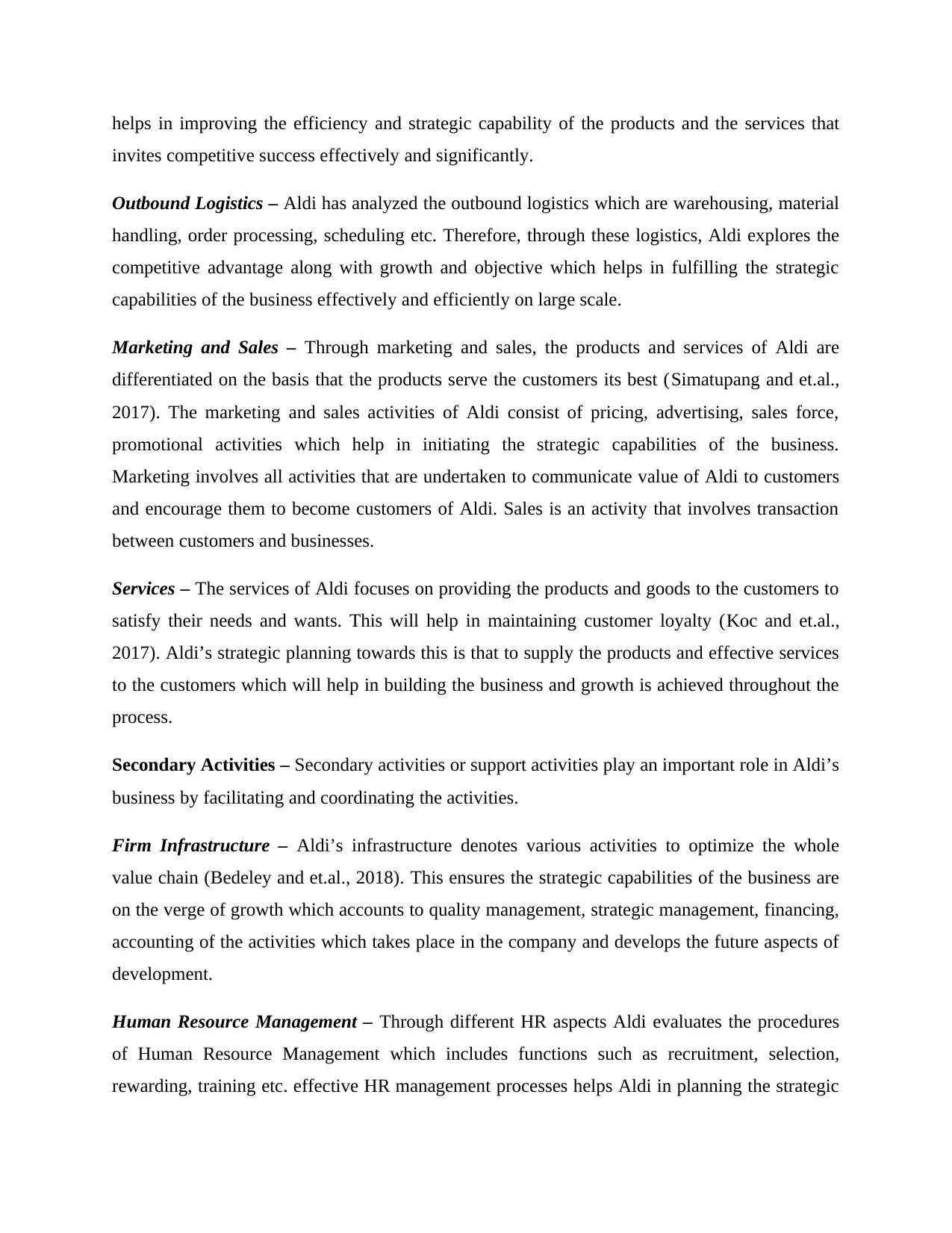
helps in improving the efficiency and strategic capability of the products and the services that
invites competitive success effectively and significantly.
Outbound Logistics – Aldi has analyzed the outbound logistics which are warehousing, material
handling, order processing, scheduling etc. Therefore, through these logistics, Aldi explores the
competitive advantage along with growth and objective which helps in fulfilling the strategic
capabilities of the business effectively and efficiently on large scale.
Marketing and Sales – Through marketing and sales, the products and services of Aldi are
differentiated on the basis that the products serve the customers its best (Simatupang and et.al.,
2017). The marketing and sales activities of Aldi consist of pricing, advertising, sales force,
promotional activities which help in initiating the strategic capabilities of the business.
Marketing involves all activities that are undertaken to communicate value of Aldi to customers
and encourage them to become customers of Aldi. Sales is an activity that involves transaction
between customers and businesses.
Services – The services of Aldi focuses on providing the products and goods to the customers to
satisfy their needs and wants. This will help in maintaining customer loyalty (Koc and et.al.,
2017). Aldi’s strategic planning towards this is that to supply the products and effective services
to the customers which will help in building the business and growth is achieved throughout the
process.
Secondary Activities – Secondary activities or support activities play an important role in Aldi’s
business by facilitating and coordinating the activities.
Firm Infrastructure – Aldi’s infrastructure denotes various activities to optimize the whole
value chain (Bedeley and et.al., 2018). This ensures the strategic capabilities of the business are
on the verge of growth which accounts to quality management, strategic management, financing,
accounting of the activities which takes place in the company and develops the future aspects of
development.
Human Resource Management – Through different HR aspects Aldi evaluates the procedures
of Human Resource Management which includes functions such as recruitment, selection,
rewarding, training etc. effective HR management processes helps Aldi in planning the strategic
invites competitive success effectively and significantly.
Outbound Logistics – Aldi has analyzed the outbound logistics which are warehousing, material
handling, order processing, scheduling etc. Therefore, through these logistics, Aldi explores the
competitive advantage along with growth and objective which helps in fulfilling the strategic
capabilities of the business effectively and efficiently on large scale.
Marketing and Sales – Through marketing and sales, the products and services of Aldi are
differentiated on the basis that the products serve the customers its best (Simatupang and et.al.,
2017). The marketing and sales activities of Aldi consist of pricing, advertising, sales force,
promotional activities which help in initiating the strategic capabilities of the business.
Marketing involves all activities that are undertaken to communicate value of Aldi to customers
and encourage them to become customers of Aldi. Sales is an activity that involves transaction
between customers and businesses.
Services – The services of Aldi focuses on providing the products and goods to the customers to
satisfy their needs and wants. This will help in maintaining customer loyalty (Koc and et.al.,
2017). Aldi’s strategic planning towards this is that to supply the products and effective services
to the customers which will help in building the business and growth is achieved throughout the
process.
Secondary Activities – Secondary activities or support activities play an important role in Aldi’s
business by facilitating and coordinating the activities.
Firm Infrastructure – Aldi’s infrastructure denotes various activities to optimize the whole
value chain (Bedeley and et.al., 2018). This ensures the strategic capabilities of the business are
on the verge of growth which accounts to quality management, strategic management, financing,
accounting of the activities which takes place in the company and develops the future aspects of
development.
Human Resource Management – Through different HR aspects Aldi evaluates the procedures
of Human Resource Management which includes functions such as recruitment, selection,
rewarding, training etc. effective HR management processes helps Aldi in planning the strategic
Paraphrase This Document
Need a fresh take? Get an instant paraphrase of this document with our AI Paraphraser
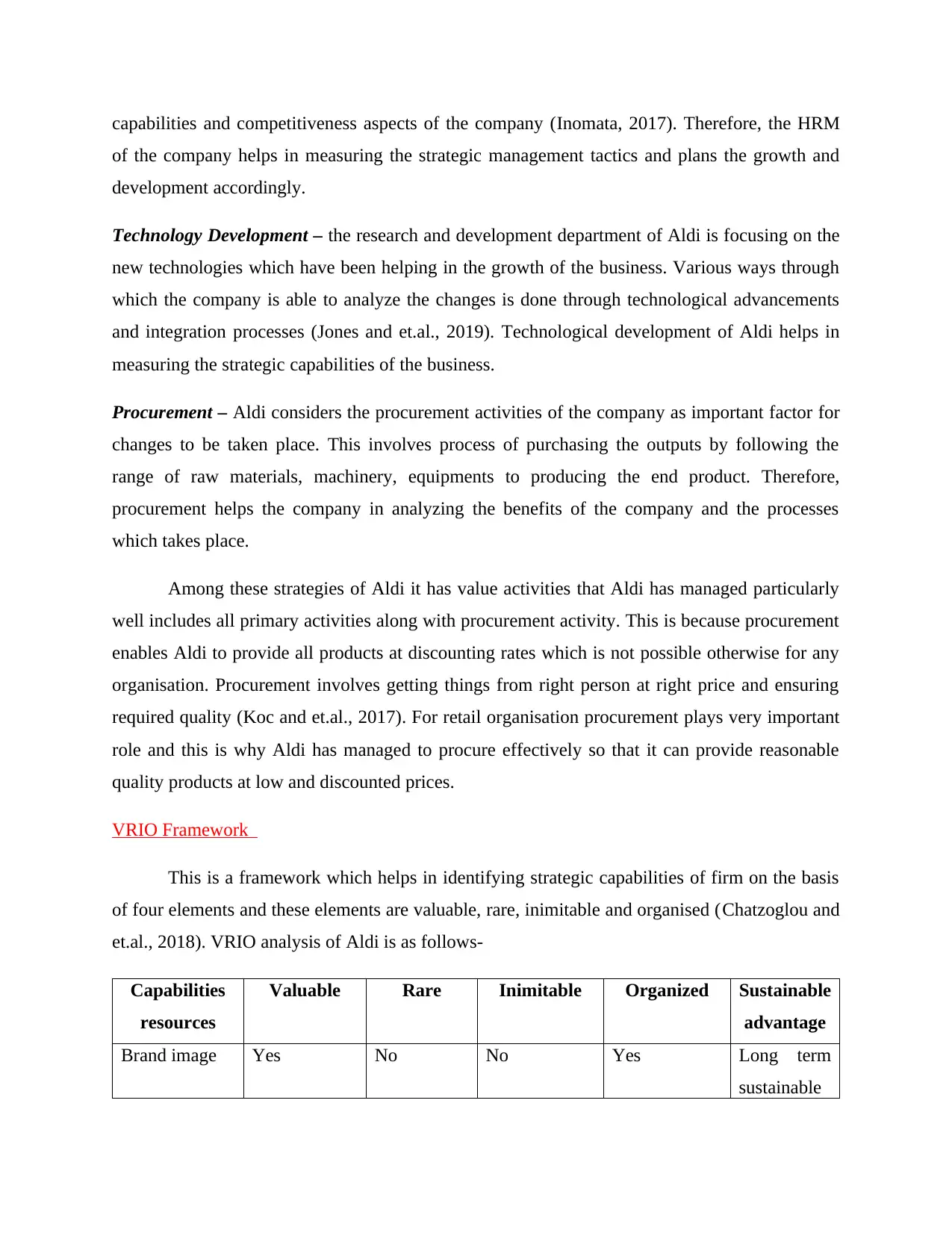
capabilities and competitiveness aspects of the company (Inomata, 2017). Therefore, the HRM
of the company helps in measuring the strategic management tactics and plans the growth and
development accordingly.
Technology Development – the research and development department of Aldi is focusing on the
new technologies which have been helping in the growth of the business. Various ways through
which the company is able to analyze the changes is done through technological advancements
and integration processes (Jones and et.al., 2019). Technological development of Aldi helps in
measuring the strategic capabilities of the business.
Procurement – Aldi considers the procurement activities of the company as important factor for
changes to be taken place. This involves process of purchasing the outputs by following the
range of raw materials, machinery, equipments to producing the end product. Therefore,
procurement helps the company in analyzing the benefits of the company and the processes
which takes place.
Among these strategies of Aldi it has value activities that Aldi has managed particularly
well includes all primary activities along with procurement activity. This is because procurement
enables Aldi to provide all products at discounting rates which is not possible otherwise for any
organisation. Procurement involves getting things from right person at right price and ensuring
required quality (Koc and et.al., 2017). For retail organisation procurement plays very important
role and this is why Aldi has managed to procure effectively so that it can provide reasonable
quality products at low and discounted prices.
VRIO Framework
This is a framework which helps in identifying strategic capabilities of firm on the basis
of four elements and these elements are valuable, rare, inimitable and organised (Chatzoglou and
et.al., 2018). VRIO analysis of Aldi is as follows-
Capabilities
resources
Valuable Rare Inimitable Organized Sustainable
advantage
Brand image Yes No No Yes Long term
sustainable
of the company helps in measuring the strategic management tactics and plans the growth and
development accordingly.
Technology Development – the research and development department of Aldi is focusing on the
new technologies which have been helping in the growth of the business. Various ways through
which the company is able to analyze the changes is done through technological advancements
and integration processes (Jones and et.al., 2019). Technological development of Aldi helps in
measuring the strategic capabilities of the business.
Procurement – Aldi considers the procurement activities of the company as important factor for
changes to be taken place. This involves process of purchasing the outputs by following the
range of raw materials, machinery, equipments to producing the end product. Therefore,
procurement helps the company in analyzing the benefits of the company and the processes
which takes place.
Among these strategies of Aldi it has value activities that Aldi has managed particularly
well includes all primary activities along with procurement activity. This is because procurement
enables Aldi to provide all products at discounting rates which is not possible otherwise for any
organisation. Procurement involves getting things from right person at right price and ensuring
required quality (Koc and et.al., 2017). For retail organisation procurement plays very important
role and this is why Aldi has managed to procure effectively so that it can provide reasonable
quality products at low and discounted prices.
VRIO Framework
This is a framework which helps in identifying strategic capabilities of firm on the basis
of four elements and these elements are valuable, rare, inimitable and organised (Chatzoglou and
et.al., 2018). VRIO analysis of Aldi is as follows-
Capabilities
resources
Valuable Rare Inimitable Organized Sustainable
advantage
Brand image Yes No No Yes Long term
sustainable
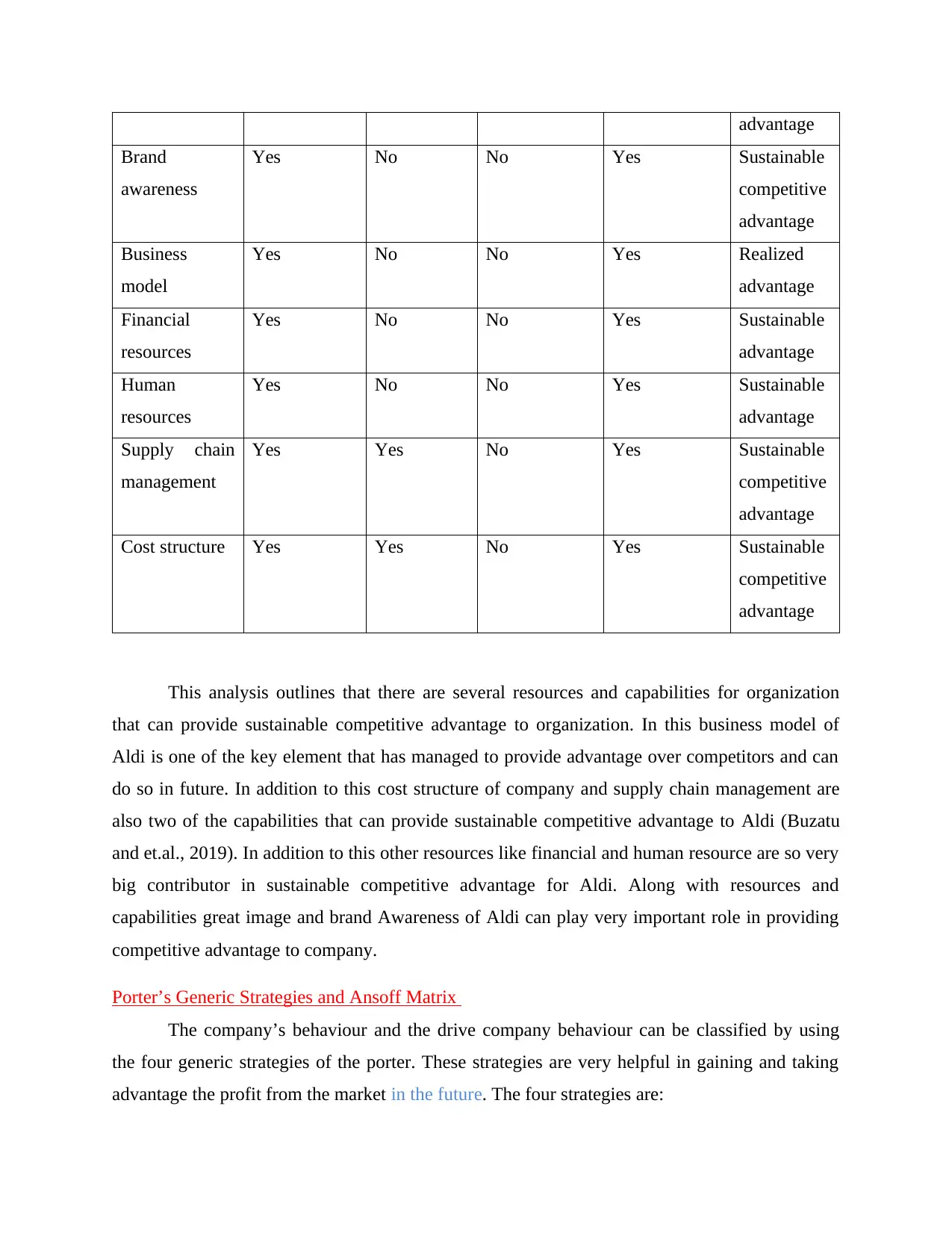
advantage
Brand
awareness
Yes No No Yes Sustainable
competitive
advantage
Business
model
Yes No No Yes Realized
advantage
Financial
resources
Yes No No Yes Sustainable
advantage
Human
resources
Yes No No Yes Sustainable
advantage
Supply chain
management
Yes Yes No Yes Sustainable
competitive
advantage
Cost structure Yes Yes No Yes Sustainable
competitive
advantage
This analysis outlines that there are several resources and capabilities for organization
that can provide sustainable competitive advantage to organization. In this business model of
Aldi is one of the key element that has managed to provide advantage over competitors and can
do so in future. In addition to this cost structure of company and supply chain management are
also two of the capabilities that can provide sustainable competitive advantage to Aldi (Buzatu
and et.al., 2019). In addition to this other resources like financial and human resource are so very
big contributor in sustainable competitive advantage for Aldi. Along with resources and
capabilities great image and brand Awareness of Aldi can play very important role in providing
competitive advantage to company.
Porter’s Generic Strategies and Ansoff Matrix
The company’s behaviour and the drive company behaviour can be classified by using
the four generic strategies of the porter. These strategies are very helpful in gaining and taking
advantage the profit from the market in the future. The four strategies are:
Brand
awareness
Yes No No Yes Sustainable
competitive
advantage
Business
model
Yes No No Yes Realized
advantage
Financial
resources
Yes No No Yes Sustainable
advantage
Human
resources
Yes No No Yes Sustainable
advantage
Supply chain
management
Yes Yes No Yes Sustainable
competitive
advantage
Cost structure Yes Yes No Yes Sustainable
competitive
advantage
This analysis outlines that there are several resources and capabilities for organization
that can provide sustainable competitive advantage to organization. In this business model of
Aldi is one of the key element that has managed to provide advantage over competitors and can
do so in future. In addition to this cost structure of company and supply chain management are
also two of the capabilities that can provide sustainable competitive advantage to Aldi (Buzatu
and et.al., 2019). In addition to this other resources like financial and human resource are so very
big contributor in sustainable competitive advantage for Aldi. Along with resources and
capabilities great image and brand Awareness of Aldi can play very important role in providing
competitive advantage to company.
Porter’s Generic Strategies and Ansoff Matrix
The company’s behaviour and the drive company behaviour can be classified by using
the four generic strategies of the porter. These strategies are very helpful in gaining and taking
advantage the profit from the market in the future. The four strategies are:
⊘ This is a preview!⊘
Do you want full access?
Subscribe today to unlock all pages.

Trusted by 1+ million students worldwide
1 out of 18
Related Documents
Your All-in-One AI-Powered Toolkit for Academic Success.
+13062052269
info@desklib.com
Available 24*7 on WhatsApp / Email
![[object Object]](/_next/static/media/star-bottom.7253800d.svg)
Unlock your academic potential
Copyright © 2020–2025 A2Z Services. All Rights Reserved. Developed and managed by ZUCOL.





